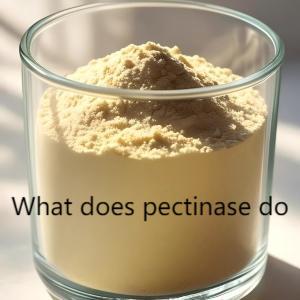What does pectinase do

What Does Pectinase Do?
Pectinase breaks down pectin, a sticky polysaccharide found in plant cell walls. By dissolving this glue-like substance, pectinase helps separate plant cells and release their contents more easily. This makes it a valuable enzyme in both natural plant processes and commercial applications like juice production and winemaking.
Pectinase and Fruit Juice Production
In the fruit juice industry, pectinase plays a starring role. It breaks down the pectin in fruit pulp, making it easier to extract juice and dramatically improving yield. It also helps clarify the juice, removing cloudiness and creating a smoother, more appealing product. Without pectinase, many juices would remain thick and murky.
The Role of Pectinase in Winemaking
Winemakers have long relied on pectinase to enhance the extraction of color, aroma, and flavor from grape skins. When grapes are crushed, pectin holds back some of these desirable elements. Pectinase breaks down these barriers, improving both the richness and clarity of the final wine. It also reduces fermentation time and sediment buildup.
How Pectinase Helps in Nature
Plants naturally produce pectinase during the ripening process. As fruit matures, pectinase helps soften the cell walls, making the fruit easier to eat and more aromatic. In the soil, fungi and bacteria use pectinase to break down dead plant matter, recycling nutrients back into the ecosystem. It’s an essential part of the natural decomposition cycle.
Other Industrial Applications of Pectinase
Beyond food and wine, pectinase is used in the textile and paper industries to soften plant fibers, making them easier to process. It’s also being studied for its role in biofuel production, where it helps break down biomass into fermentable sugars. Its versatility makes it an increasingly valuable tool across sectors.
